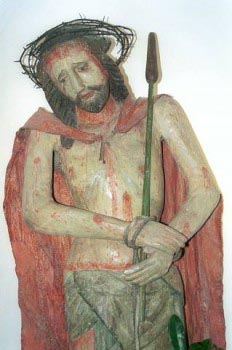
Our Lord’s sufferings were so great because his soul was in suffering. What shows this is that his soul began to suffer before his bodily passion, as we see in the agony in the garden.
The first anguish that came upon his body was not from without—it was not from the scourges, the thorns, or the nails, but from his soul. His soul was in such agony that he called it death: “My soul is sorrowful even unto death” (Mark 14:34). The anguish was such that it burst open his whole body, as it were. It was a pang affecting his heart, as, in the deluge, the floods of the great deep were broken up and the windows of heaven were opened. The blood, rushing from his tormented heart, forced its way on every side, formed for itself a thousand new channels, filled all the pores, and at length stood forth upon his skin in thick drops, which fell heavily on the ground (cf. Luke 22:44).
He remained in this living death from the time of his agony in the garden; and as his first agony was from his soul, so was his last. As the scourge and the Cross did not begin his sufferings, so they did not close them. It was the agony of his soul, not of his body, which caused his death. His persecutors were surprised to hear that he was dead. How, then, did he die? That agonized, tormented heart, which at the beginning so awfully relieved itself in the rush of blood and the bursting of his pores, at length broke. It broke, and he died. It would have broken at once, had he not kept it from breaking. At length the moment came. He gave the word, and his heart broke.
O tormented heart, it was love and sorrow and fear that broke you. It was the sight of human sin, it was the sense of it, the feeling of it laid on you; it was zeal for the glory of God, horror at seeing sin so near you, a sickening, stifling feeling at its pollution, the deep shame and disgust and abhorrence and revolt it inspired, keen pity for the souls whom it has drawn headlong into hell—all these feelings together you allowed to rush upon you. You submitted yourself to their powers, and they were your death. That strong heart; that all-noble, all-generous, all-tender, all-pure heart was slain by sin.
O most tender and gentle Lord Jesus, when will my heart have a portion of your perfections? When will my hard and stony heart, my proud heart, my unbelieving heart, my impure heart, my narrow, selfish heart be melted and conformed to yours? Oh, teach me so to contemplate you that I may become like you and to love you sincerely and simply, as you have loved me.
It is over now, O Lord, as with your sufferings, so with our humiliations. We have followed you from your fasting in the wilderness till your death on the Cross. For forty days we have professed to do penance. The time has been long, and it has been short; but whether long or short, it is now over. It is over, and we feel a pleasure that it is over; it is a relief and a release. We thank you that it is over. We thank you for the time of sorrow, but we thank you more as we look forward to the time of festival. Pardon our shortcomings in Lent and reward us in Easter.
We have, indeed, done very little for you, O Lord. We recollect well our listlessness and weariness; our indisposition to mortify ourselves when we had no plea of health to stand in the way; our indisposition to pray and to meditate, our disorder of mind, our discontent, our peevishness. Yet some of us, perhaps, have done something for you. Look on us as a whole, O Lord, look on us as a community, and let what some have done well plead for us all.
O Lord, the end is come. We are conscious of our languor and lukewarmness; we do not deserve to rejoice in Easter, yet we cannot help doing so. We feel more of pleasure, we rejoice in you more than our past humiliation warrants us in doing; yet may that very joy be its own warrant. Oh, be indulgent to us, for the merits of your own all-powerful Passion, and for the merits of your saints. Accept us as your little flock, in the day of small things, in a fallen country, in an age when faith and love are scarce. Pity us and spare us and give us peace.
O my own Savior, now in the tomb but soon to arise, you have paid the price; it is done—consummation est—it is secured. Oh, fulfill your Resurrection in us, and as you have purchased us, claim us, take possession of us, make us yours.
John Henry Newman, Meditations and Devotions, p. 323-327.
